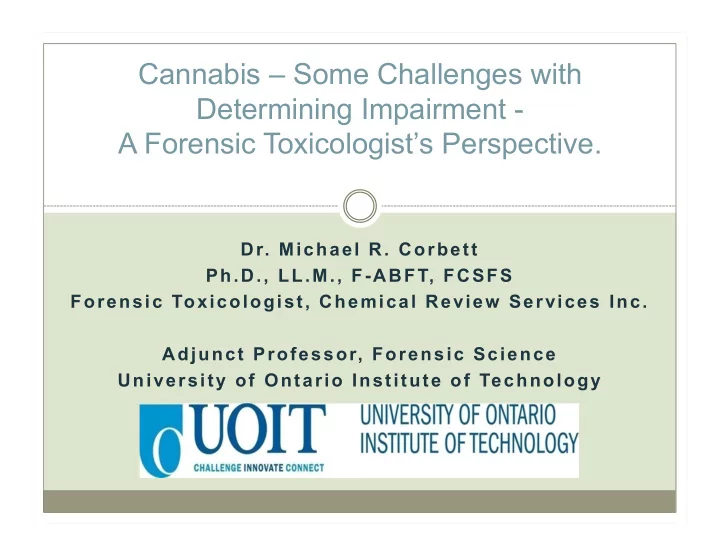

Cannabis – Some Challenges with Determining Impairment - A Forensic Toxicologist’s Perspective. Dr. Michael R. Corbett Ph.D., LL.M., F-ABFT, FCSFS Forensic Toxicologist, Chemical Review Services Inc. Adjunct Professor, Forensic Science University of Ontario Institute of Technology
Illuminating the Field – Forensic Toxicology
Illuminating the Field – Cannabis
Casarett & Doull’s Toxicology
Toxicology – Definition - Academic Toxicology has been defined as the study of the adverse effects of xenobiotics … Toxicology, like medicine, is both a science and an art. The science of toxicology is defined as the observational and data gathering phase, whereas the art of toxicology consists of the utilization of the data to predict outcomes of exposure in human and animal populations. Gallo, M.A. (2013). History and Scope of Toxicology. In C.D. Klaassen (ed.), Casarett & Doull’s Toxicology: The Basic Science of Poisons , 8th ed. Toronto: McGraw Hill. (p.3.)
Society of Toxicology
Toxicology – Definition - SOT The study of the adverse effects of chemical, physical or biological agents on people, animals, and the environment.
SOT – Specialty Sections 27 speciality sections One of them is entitled Ethical, Legal, and Social Issues
Society of Forensic Toxicologists - SOFT
Forensic Toxicology – Definition - SOFT Toxicology is the study of the adverse effects of drugs and chemicals on biological systems. Forensic toxicology deals with the application of toxicology to cases and issues where those adverse effects have administrative or medicolegal consequences, and where the results are likely to be used in court. Forensic toxicology is a modern science, based on published and widely accepted scientific methods and practices, for both analysis of drugs in biological materials, and interpretation of those results. http://www.soft-tox.org/files/SOFT_Brochure_(2013).pdf
Alcohol – A Drug with Distinction
American Board of Forensic Toxicology - ABFT
Forensic Toxicology – Definition - ABFT Forensic toxicology encompasses the measurement of alcohol, drugs and other toxic substances in biological specimens and interpretation of such results in a medicolegal context. (current) The study and practice of the application of toxicology to the purposes of the law. (prior) http://www.abft.org/
Toxicology – Specialized Science A specialized science of the adverse effects of chemicals on biological subjects (eg. people). Ethanol Drugs Chemicals Biotoxins Above terms are not mutually exclusive
Forensic Toxicology - Specialties Postmortem Human Performance Employment / Applicant (eg. Insurance) Athletic Competition Equine Environmental overlap with some other fields Occupational Medicine Medical Toxicology Epidemiology
Drug Testing – Some Considerations Specimens Application: Clinical or Forensic Nature: Screening or Confirmation Result: Qualitative or Quantitative Use: Investigative Aid or Evidence
Routes of Flow of Chemicals in the Body [ Casarett & Doull’s Toxicology , p.154.]
Immunoassay (IA) Urine – Clin / For – Screening – Qualitative – Investigative Aid
Gas Chromatography with Mass Spectrometry (GC-MS) Urine – Forensic – Confirmation – Quantitative - Evidence
Challenges with Determining Impairment – Times
Challenge 1: Time of Specimen Collection
Marijuana and the Cannabinoids
PL Concentrations After Smoking Cannabis
Challenge 2 – Time of Use
I Don’t Know
Challenge 3: Relating Test Result to Time of Incident
Human Growth and Development
Cannabis – Selected Psychoactive Effects
THC – Individual Subject Effects - High
Host Factors - Drug Response
Illuminating – Cannabis – Wake n’ Bake
Challenge 4: Time of Retainer
Expert Evidence
CLE – Interaction with Experts The expert’s opinion must be and must be seen to be detached and independent. Counsel must be fair in ensuring that the expert has proper material to formulate an opinion. [Lauwers J., “Comments on Expert Evidence”, in Expert Reports at 8. (Paper presented to the MLST, 23 January 2012)]
CLE – Experts & Documents Experts must ensure that they obtain all of the necessary documents and review them with a critical eye, rather than simply accepting information from a litigant. [Troy H. Lehman, in Expert Evidence in Personal Injury Cases at 23. (Paper presented to Osgoode Prof. Develop., 2 April 2012)]
Expert & Counsel – Attempting to Walk on Water
Finishing Time
Recommend
More recommend